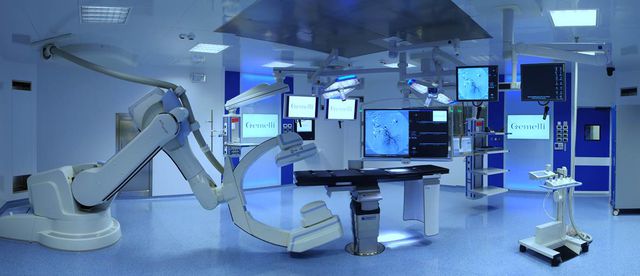A growing trend towards a multidisciplinary approach in patient care has lead to select heart centers developing a new type of medical facility: the hybrid operating room.
Hybrid operating rooms combine a cardiac catheter lab with a surgical operating theater. The catheter lab is used mainly by cardiologists to diagnose heart conditions and perform minimally-invasive heart procedures such as cardiac ablation or certain heart valve procedures. The operating theater contains everything a heart or cardiovascular surgeon needs to perform open or minimally-invasive surgery.

In this new setup, everything related to heart health can be found in one place: diagnostics, equipment for minimally-invasive procedures and facilities for open-heart surgery. It is now possible to simultaneously diagnose and treat many heart conditions without having to move the patient or personnel. This makes for a more efficient setup, saving time for the medical personnel and providing patients with a higher standard of care.
These modern medical facilities are equipped with state-of-the-art imaging technology, such as MRI, CT and X-Ray. This allows cardiologists to get detailed images of the heart so they can provide an accurate and specific diagnosis. It also allows them to visualize the area of the body they are operating on during minimally-invasive and percutaneous heart procedures, eliminating the need to cut open the body. As heart surgery becomes less invasive and catheter-assisted heart procedures become more common, having accurate visuals has become even more important for cardiologists and heart surgeons.
In these new hybrid facilities, cardiologists work side-by-side with highly skilled heart and vascular surgeons. A surgeon may be on hand to be available for emergency open heart surgery in case a complication with a minimally-invasive procedure occurs, or they may rely on the imaging provided by cardiologists to guide them during planned surgeries.
In addition to a cardiologist and at least one operating surgeon, a number of other specialists add their expertise to the multidisciplinary team that works in a hybrid operating room. These may include an imaging specialist, an anesthesiologist and nurse practitioner or physician assistant. This ensures a balanced, comprehensive approach to patient care.
Hybrid treatment strategies and technological developments have lead to less-invasive, more effective treatment options for patients with all kinds of heart conditions. Because of the success of these multidisciplinary approaches, hybrid operating rooms are becoming a standard feature in many of Germany’s top cardiology and heart centers - including several clinics in the Premier Healthcare Germany network.
